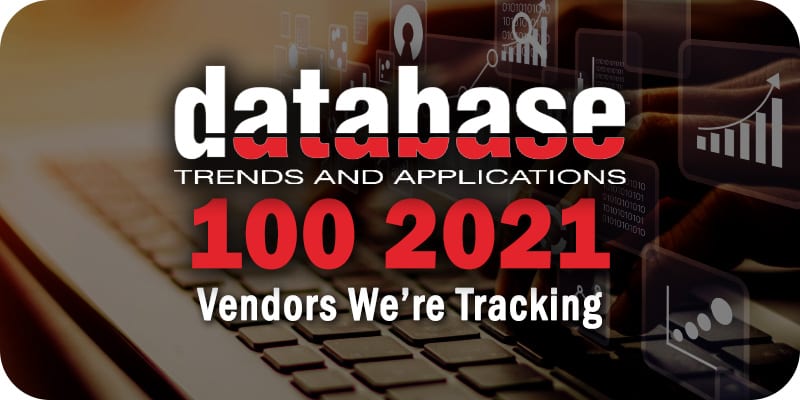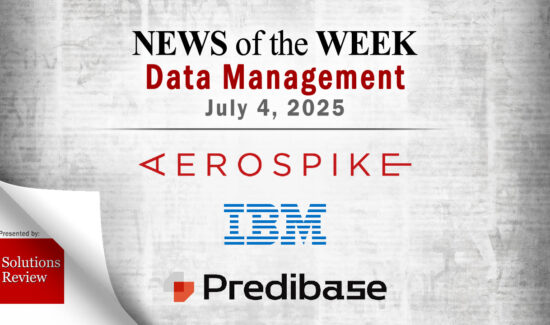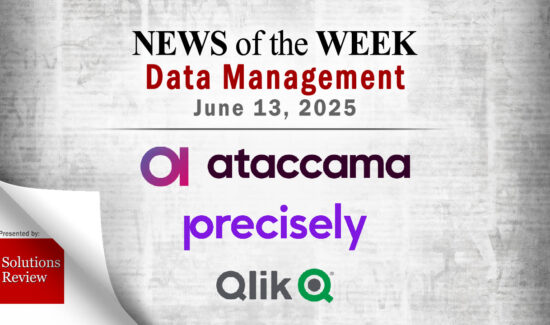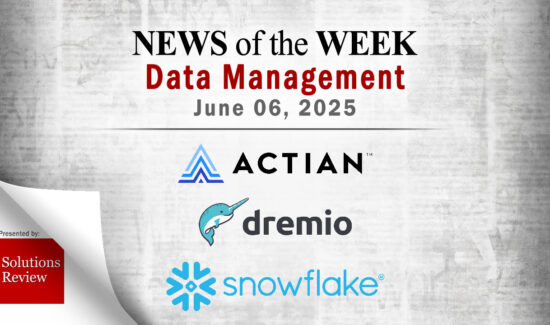DBTA 100 2021: 14 Database Management Vendors We’re Tracking

![]()
Our coverage of the DBTA 100 2021 features data management vendors our editors are tracking. For a larger list, see our Data Management Solutions Directory.
Database Trends and Applications recently released its DBTA 100 2021, an annual listing of data, information management, big data, and data science companies that are preparing for the future. The list spans the spectrum of both “well-established and cutting edge” solution providers offering data platforms, tools and technologies to organizations around the globe. Some of the vendor entries are published alongside View From the Top articles which are penned by executives from the companies themselves.
The editors at Solutions Review have reviewed the DBTA 100 2021 with a fine-tooth comb to identify the database management vendors that matter most. Look at it as a sneak peak into which solution providers we track against in our daily coverage of the marketplace. You’ll even find some of these company names below in our freshly pressed Buyer’s Guide for Data Management Platforms.
Couchbase
Couchbase offers Couchbase Server, an open source distributed multi-model NoSQL document-oriented database software package that was designed for interactive applications. Couchbase can be clustered from a single machine to very large-scale deployments spanning many machines. The product also provides simple scaling key-value or JSON document access with low latency and high sustained throughput.
DataStax
DataStax offers a distributed hybrid cloud database built on Apache Cassandra. The company’s flagship product is DataStax Enterprise, a solution that makes it easy for enterprise to exploit hybrid and multi-cloud environments via a data layer that eliminates complexity associated with deploying applications across multiple on-prem data centers or multiple public clouds. Its enterprise data layer eliminates data silos and cloud vendor lock-in and powers mission-critical applications.
EnterpriseDB
EnterpriseDB offers data management tools based on the open source database PostgreSQL. The vendor develops and integrates performance, security and manageability enhancements into PostgreSQL to support enterprise workloads. EnterpriseDB has also developed database compatibility for Oracle to facilitate workload migrations from Oracle to EnterpriseDB. The Postgres database is available via subscription in two different options, and includes tool suites, upgrades, support and maintenance.
Dremio
Dremio offers a product called Data Lake engine that provides fast query speed and a self-service semantic layer that operates directly against data lake storage. The solution connects to S3, ADLS, Hadoop or wherever enterprise data resides. Apache Arrow, Data Reflections and other Dremio technologies work together to hasten query speeds, and the semantic layer enables IT to apply security and business meaning. Users do not have to send data to Dremio or have it stored in proprietary formats to access it.
IBM
IBM has data management products for virtually every enterprise use case. Its products can be deployed in any environment, and partnerships with some of the other top names in the marketplace make it an even more intriguing option for organizations with large workloads and expansive data jobs. IBM also offers its Informix database that can integrate SQL, NoSQL/JSON, time series and spatial data.
MariaDB
MariaDB is an open-source and commercially supported fork of the MySQL relational database management system. It was developed by the original creators of MySQL and turns data into structured information in a wide array of applications. MariaDB features an expansive ecosystem of storage engines, plugins and many other tools. The latest version of MariaDB includes GIS and JSON functionality. The database is supported by Microsoft Azure and Amazon RDS and is available as-a-service for production workloads from the source by MariaDB Corporation as SkySQL.
Microsoft
Microsoft offers an array of data management products, including those for analytics, data governance, and even data virtualization. Its SQL Server solution provides data warehousing for both on-prem and cloud deployments, as well as an in-memory database. Microsoft allows organizations to access, store, and analyze any kind of data and even offers fully-managed Hadoop and Spark. The company is one of the major players in the overall big data marketplace, with top-ranked tools in business intelligence and data integration.
MongoDB
MongoDB is a cross-platform document-oriented database. It is classified as a NoSQL database program, and uses JSON-like documents with schema. The software is developed by MongoDB and licensed under the Server Side Public License. Key features include ad hoc queries, indexing, and real-time aggregation, as well as a document model that maps to the objects in your application code. MongoDB provides drivers for more than 10 languages, and the community has built dozens more.
Oracle
Oracle’s suite of data management capabilities allows users to manage both traditional and new data sets on its cloud platform. The company also offers an autonomous data warehouse cloud with more than 2,000 SaaS applications. The platform runs the gamut of big data functionality, with support for data integration and analytics as well. Its other data management offerings include Oracle Big Data Cloud, Oracle Big Data Cloud Service, Oracle Big Data SQL Cloud Service, and Oracle NoSQL Database.
Redis Labs
Redis Labs is best known for its Redis Enterprise, a database product that takes advantage of modern in-memory technologies like NVMe and Persistent Memory to provide deployment over cloud and on-prem data centers. The solution features native data structures and a variety of data modeling techniques such as streams, graph, document and machine learning with a real-time search engine. Redis has also had considerable success entering strategic partnerships with vendors such as Pivotal and Red Hat.
SAP
SAP offers its data management capabilities on a single platform. SAP HANA allows users to collect and combine all types of data in-real time, as well as enhance data governance, monitoring, and orchestration. Users can also create a unified view of data with smart data integration that enables advanced applications and data management. The platform is flexible and can be deployed on-prem, in the cloud or via hybrid deployments. HANA is an in-memory tool with fast data processing and advanced analytics with OLAP and OLTP processing.
SingleStore
SingleStore can ingest and transform millions of events per day while also analyzing billions of rows of data using standard SQL. It can be deployed on-prem, in the cloud via Amazon Web Services or Microsoft Azure, or as a service including drop-in compatibility with existing middleware, integration, and BI software. The tool offers excellent real-time data streaming capabilities, and now provides more efficient query isolation for large volumes of data and many users.
Splice Machine
Splice Machine is an open source database management system that is powered by Hadoop and Spark. Key features of the software include ANSI SQL-99 coverage, ACID transactions with Snapshot Isolation semantics, in-place updates that scale from one row to millions, and secondary indexing in both unique and non-unique forms. One of Splice Machine’s building blocks is Apache HBase.
TigerGraph
TigerGraph offers a graph database platform for enterprise applications. The product supports real-time deep link analytics for organizations with large data volumes. TigerGraph can be utilized for applications like IoT, AI, and machine learning to make sense of changing big data. The solution also provides personalized recommendations, fraud prevention, supply-chain logistics, and company knowledge graph.




















